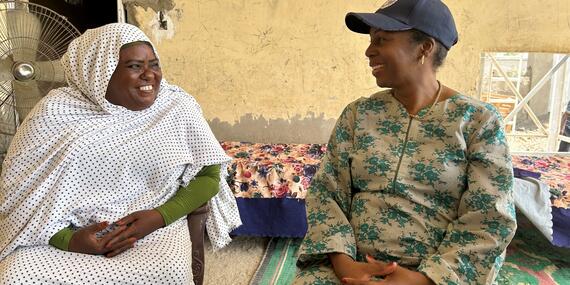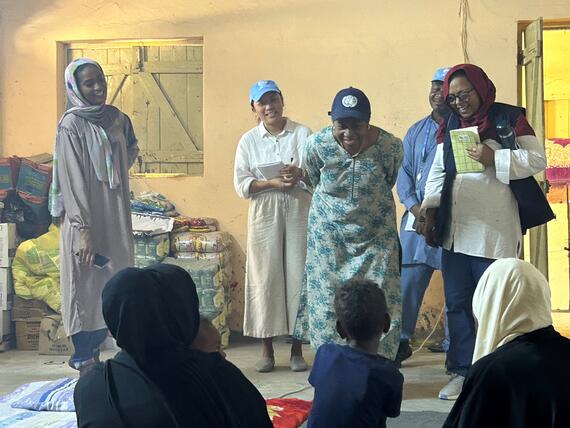“I could not leave them behind.” One woman’s determination to help orphans and single mothers in Sudan

By Tapiwa Gomo
"I had to choose between saving my life and escaping alone or taking the risk and relocating with single mothers and orphaned children under my care,” said Nour Hussein Al Sewaty, Founder and Director of Shamaa Organization, a local non-profit in Sudan’s capital, Khartoum.
Shamaa provides shelter and support to divorced women, single mothers and orphans. Founded by Nour in 2007, the organization has assisted more than 8,000 underprivileged women and orphans.
But Nour and those under her care are now some of the more than 10 million people forced to flee their homes since the war erupted in Khartoum in April 2023. Sudan is now one of the world’s largest displacement crises. Half of the population faces acute hunger and famine is now confirmed in some areas.
Before the conflict, Shamaa sheltered 45 women, many of whom were rejected by their spouses, families, and communities for having children outside of marriage. Shamaa supported the women and orphans who were in a legally and socially precarious situation, drawing expert services from its network of volunteers.

When the war began, Nour faced a terrifying challenge. Armed men threatened her, demanding she hands over the women and girls under her protection. But Nour refused.
"They pointed a gun at me, but I refused to give in. I was determined to move to Wad Medani with the women and orphans,” she recalled.
Wad Medani, in Al Jazirah State, was a refuge for displaced people and a hub for humanitarian organizations before the war spread there in mid-December 2023.
Nour explained: “I could not leave them behind, especially after having witnessed what happened to other women and girls.”
Nour’s fears are well founded; reports indicate that 6.7 million people in Sudan are at risk of gender-based violence, including kidnapping, forced marriage, conflict-related sexual violence and harmful practices, such as child marriage.
She managed to escape from Khartoum to Wad Medani with 20 people, some of whom were pregnant. The mothers were aged between 14 and 32, while the children ranged from just three months old to six years old.
Nour explained: “I was happy when a national organization came to our rescue and provided transport to Wad Medani.”
When the conflict reached Wad Medani, that same national organization helped them flee to Port Sudan, where they joined tens of thousands of other displaced people at a gathering site in a local school. One month later, the Government moved them to Abu Hashish in the City of Port Sudan.
“We stayed in the open without food and clean water. It was tough, mainly for women and children,” Nour said.
Since arriving at their new location, Nour has reached out to well-wishers for support and received aid from local and international organizations.
The UN, humanitarian partners and individual well-wishers have provided essential supplies, including tents, household items, food and cash assistance, for 15 families, and clothing for orphans and single mothers. “They also helped rehabilitate the rooms and sanitation facilities,” Nour added.
Nour’s personal journey: From abandonment to advocating for the vulnerable
Nour’s dedication to helping and advocating for women and children is deeply personal. Abandoned as an infant, she grew up in an orphanage in Maygoma, Khartoum North. Through hard work and resilience, she navigated life challenges, and with help from well-wishers, she obtained a degree from a university in Amman, Jordan. Throughout all this, she never let go of her dream to one day run a centre to give hope to abandoned children and single mothers.
But starting Shamaa Organization was not easy for Nour, as orphans, single mothers, and divorced women face stigma, discrimination, and marginalization in Sudan. Society shunned the idea of establishing the organization, and the authorities were reluctant to offer support. To gain approval, Nour had to include training sessions for girls on avoiding early pregnancies.
Shamaa now works with the Social Welfare and Child Welfare ministries, and it has agreements with health-care facilities in Khartoum, Khartoum North, and Omdurman for maternal and childcare service referrals. Before the conflict, Shamaa also worked with hospitals to ensure that single women received dignified health care and were discouraged from abandoning their children.
Despite the hardships, Nour sees hope in the young women, girls, and children she supports: “Every time I speak with them, they share their dreams. They want to go back to school. They want to have a career, to be administrators, accountants and others. Some of them were students in Khartoum, and they wish to go back to school and make their dreams come true.”
